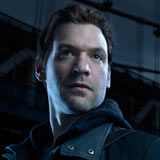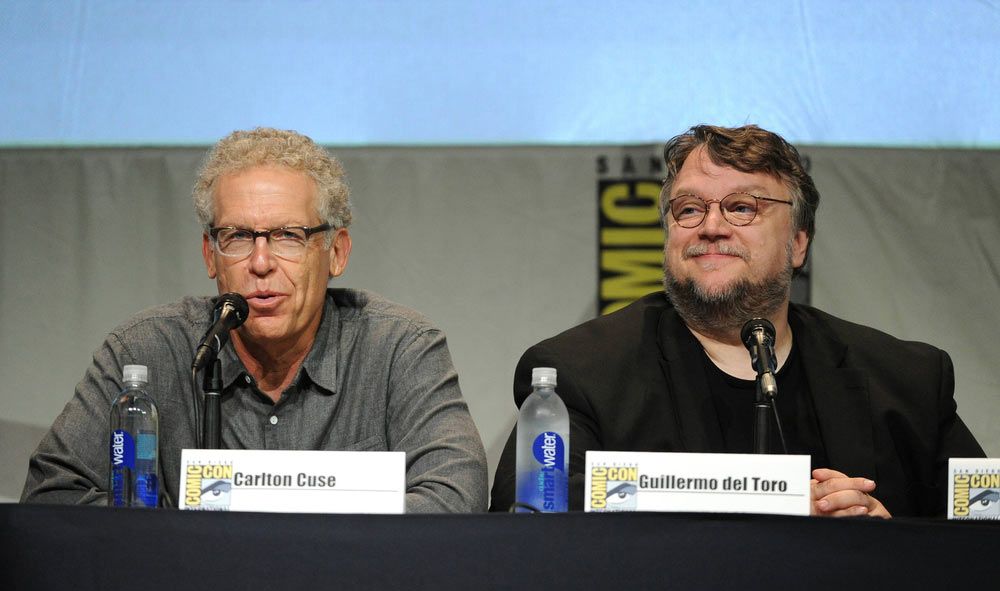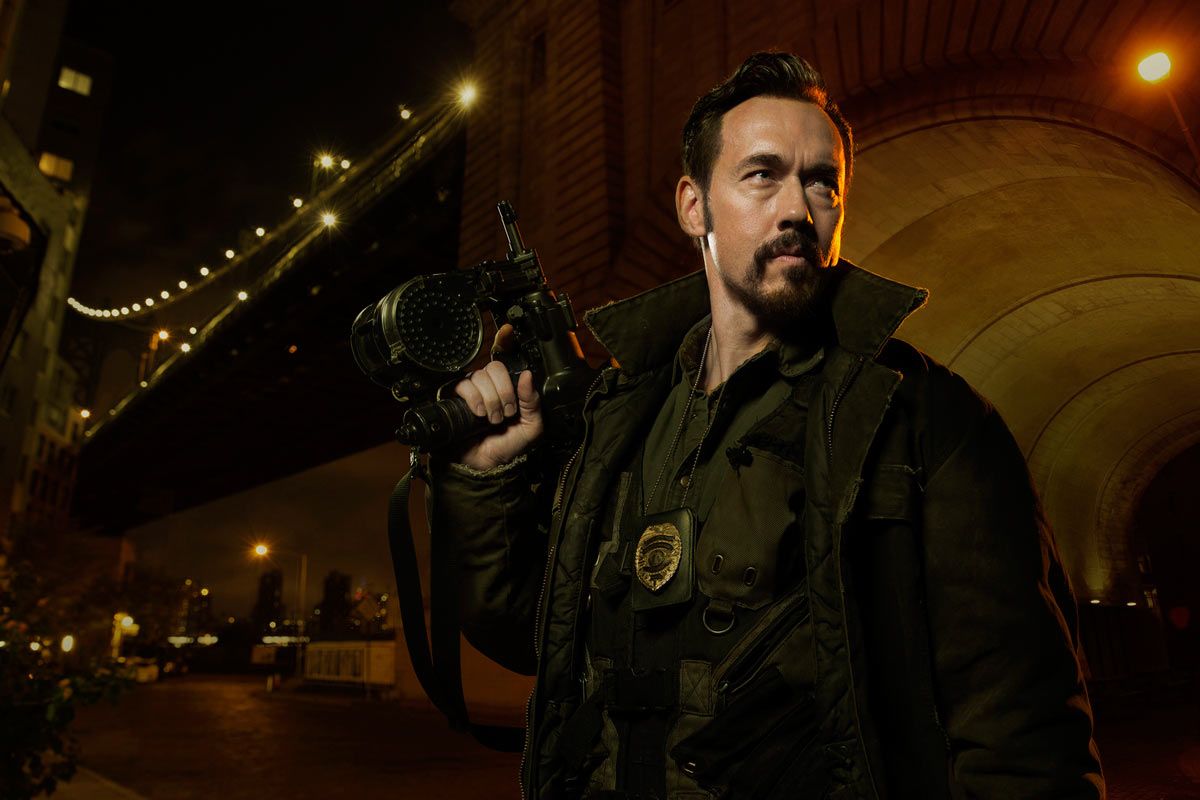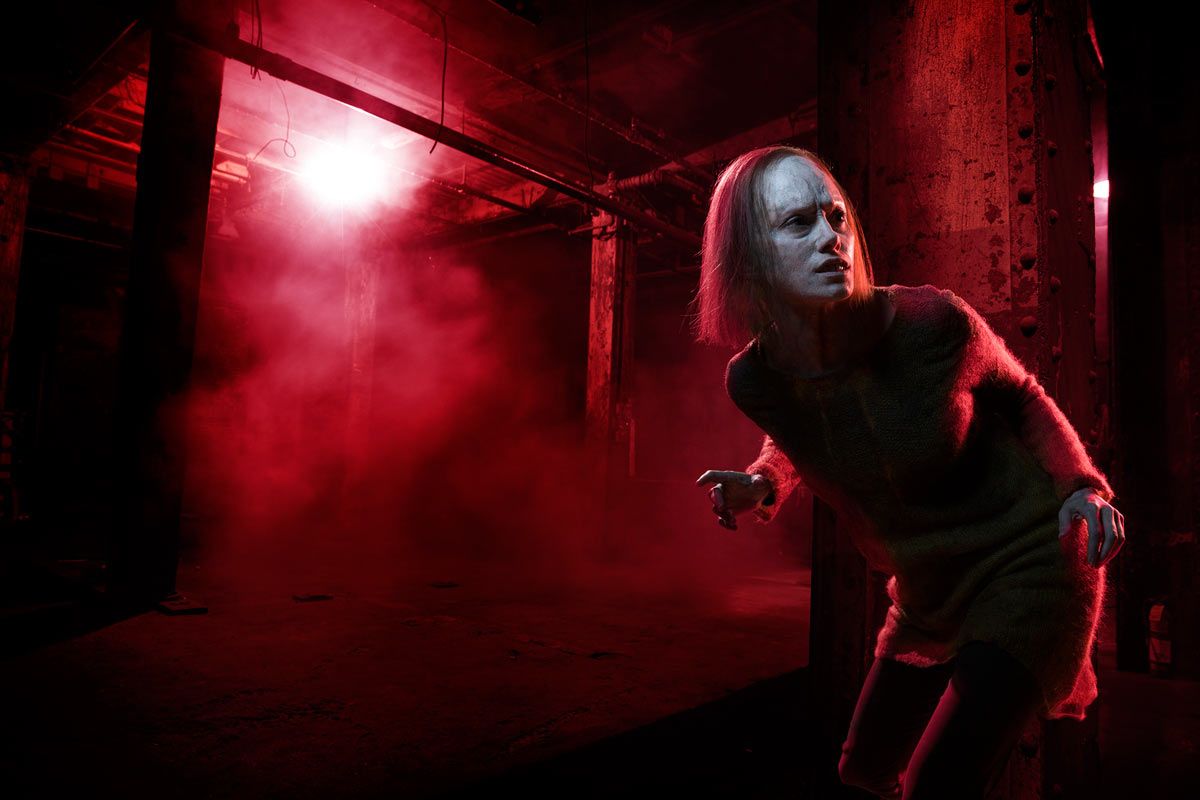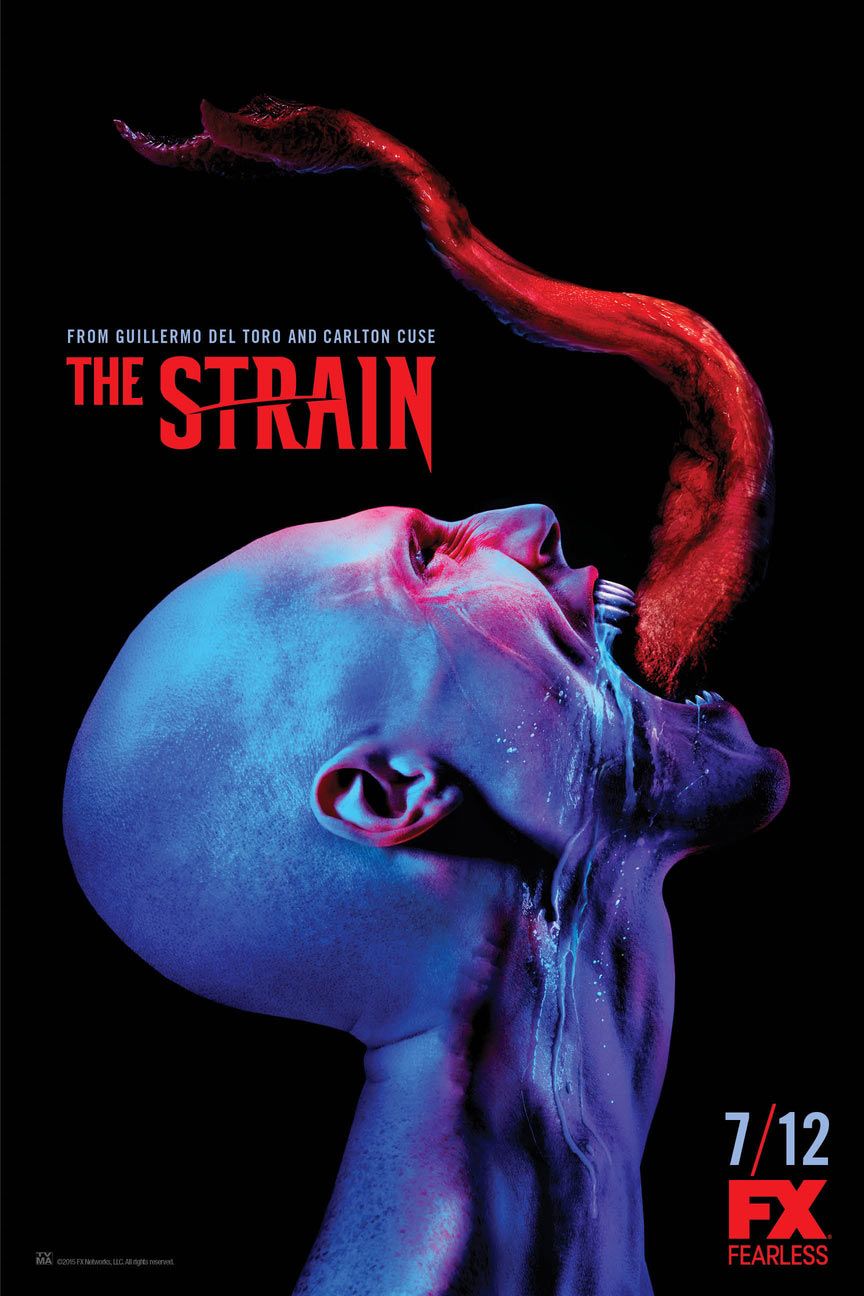The bloodthirsty vampires of "The Strain" have our heroes on the run -- or, at least that is what a group of reporters were told during a recent set visit. On an April afternoon in 2015, FX's supernatural thriller was filming on location at Toronto's Fairmont Royal York Hotel. The spoiler-heavy, Season 2 episode involves a rescue mission and subsequent chase through the hotel's stairwells. The cramped space didn't allow any extra bodies to get close enough to witness any of the action, so the members of the press were holed up in a large ballroom.
It wasn't long before co-creator and executive producer Guillermo del Toro and showrunner Carlton Cuse sat down to talk with reporters, including SPINOFF Online, about Season 2, del Toro filming a prologue sequence, his busy schedule and their five-year plan for the series. In addition, the duo spoke about Eph's drinking problem, and actor Corey Stoll's wig.
We've been hearing a lot about this prologue [which aired as part of July 12's season 2 premiere] that you've been working on, and this is Abraham's backstory?
Guillermo del Toro: Yeah, it's a brief prologue. It's about nine minutes and it's just the origin of the Master. We were going to shoot it as part of the pilot originally, but we found that the pilot was already heavy. We were 70-something minutes and we said "Let's save it for Season 2" in the hopes that I would shoot the whole pilot for Season 2. As it was, I said, "Why don't we separate the prologue?" which is its own little unit and then that's what I shot. I shot a little bit of second unit this season and I shot a black-and-white wrestler Mexican movie. And I said, "I was getting all the candy, so why not go for a little bit of that?" It was shot within the confines of other shoots according to the locations. So instead of me being the main shoot, I was the guy that came in when the main unit left [laughs]. And it was fun. It was a lot of fun.
When did you realize how finite your time was going to be this season in terms of directing?
Del Toro: I knew I wanted to help second unit. I knew that because it's always fun. Miles Dale and I do a little bit of clean-up unit and second unit because what is great is in the middle of your week, you have a day or two to shoot. Mostly, sadly, on "The Strain," it's night. So all of the sudden from 6 p.m. in the afternoon to 6 a.m. in the morning, you're in a set somewhere really cold, shooting inserts of hands or action moments, stuff like that, but I knew I couldn't do the whole episode because I needed to deliver "Crimson Peak" in May. I'm still in post on that and I knew that it would be too much. I'm prepping "Pacific Rim 2," so it was very difficult for me to do a full episode this season
It seems as if the second season deviated more and more from yours and Chuck's [Hogan] books.
Del Toro: Yes.
Talk a bit about the changes they've made, why they were necessary and how you feel watching this go off as sort of its own thing.
Del Toro: Well, from the beginning, even in Season One, Carlton was going off-book and its very clear to me that "The Strain" needed to be run by the showrunner. Carlton has always been responsible for the screenplay and development of the story. I try to be unobtrusive and not keep quoting the book. I do when it gets really to a point where I say, "This does not work for this reason," but you cannot say it's because of the book. Carlton is very respectful of the areas that are controlled by me and I'm very respectful of that. This season, we knew that if we stayed on-book we would have less discoveries. There's stuff with Fet that wasn't in the book that's been really, really good. The Master -- the finale of the first season -- was not in the books and it's really one of my favorite episodes, the final episode. So it's about saying, "Let these things have a life of their own." There are characters in the book that live and die, and characters that would have been dead six episodes ago and are now alive, and characters that were minor are now gaining a footing. It's a very different medium, so I watch it with curiosity. So it's Carlton and Chuck running this season much more than the books.
Are there parts that still feel like they're canon from the second and third books?
Del Toro: We agreed from the beginning that we would try to hit the big notes. But if you do a change that you think is good that ripples through, then you ripple it through. As long as they're working, the episodes, and Carlton is happy with the development of that, I think it's an organic process. You still shoot episode after episode. You learn that you're going to going to generate blue pages or golden pages for [episode] 11 in the middle of shooting 8 or 9 and you go, "Well that's a good idea," and then it ripples. It's a very different medium. I'm kind of still getting used to it, to be honest. I'm still, "What?" I read a great scene three weeks ago and then three weeks later, it's gone. And I go, "What happened?" "This Happened." "Ok." I'm still on dailies. I'm looking at assemblies. And when we need to strengthen a moment, or when we need a little more strong action, I go shoot a little of that, but I leave that part up to Carlton.
Once you saw these actors inhabit the roles you helped create, did it change your thinking about those characters at all?
Del Toro: There are new characters, like Dutch. I like that character very much because it makes Vasiliy find a foil that is not just Ephraim. He really has repartee with her that is very strong. She really has interesting angles. I like that character. But the other actors, I couldn't be happier to see them exactly or variations that are more interesting than I thought. David Bradley, I think the way Carlton writes Setrakian is more interesting for me than the Setrakian in the books, because this one is more sociopathic. Setrakian is gruffer in the series and less likable in a way. You love him, you love watching him, but to the other characters he is like sandpaper. He doesn't have this fragile - he's not vulnerable and I like that. I like that change in him. The rest are great. Fet was written in the books for Ron Perlman, but Ron was on "Sons of Anarchy" when we started, and I think that Kevin [Durand] has now, for me, become Vasiliy. I cannot imagine Ron in that role now. It's surprising and great.
Given the new life of these characters do you still think that the show can only go five seasons?
Del Toro: Oh yeah.
Or do you see it going longer?
Del Toro: Oh no. Four to five seasons. It's surprising because unlike in a movie -- with a movie you work for two to three years and then the movie comes out and basically after one weekend it's thrown to posterity. Some people may come, it becomes a movie that people like, it's completely fortuitous. But TV, you live and die through 13 weekends. It's so taxing. Every week you go, "Phew!" And then "Oh my God! The next chapter airs in a few days." Then you go through the trial and error again. It's really, for me, surprising that a series can last more than four or five seasons because you're never stopping. You finish the first season and you have a few weeks and then you're prepping the next one, and it becomes a huge way of life. I think five seasons is a good measure.
Eph's drinking is a very real element in this very heightened world. Is that one of the reasons why you wanted to tell that story? So it would kind of ground that story a little bit more?
Carlton Cuse: Yeah, I mean, I think that it felt like a great piece of character pathology to give to him. What I think is interesting is that we've done it a very different way than, for instance, Peter Russo in "House of Cards." Eph is actually happy and loquacious and animated --
Del Toro: Highly functional.
Cuse: And [a] highly functional drunk and so we wanted to put a different spin on it and certainly Corey [Stoll] didn't want to do another version of what he had done on that show.
Del Toro: And he grows darker.
Cuse: He grows darker and it's very much a result of what's happened to him. He's lost his wife, first through divorce and then to vampirism. He's struggling to forge a relationship to his kid and his relationship with Nora is kind of on the rocks. There's a lot of stress and I think this is both a way to show him being both functional, but to also show the cost and consequences of everything that's going on, on a character level.
Del Toro: Even in the books we made the decision, and this has grown into the series, to not make Eph likable at all. I mean, when we did the first book and we did the press tour, we said you're going to see the hero do things you don't like and you're going to hopefully see the bad guys do things that you like. And I think in the series Eph takes a really questionable ethical path in the second season and it's going to continue and to show him to be, not only to be fallible, but actually, you know, you understand the complaints that are articulated about him in the first season. "You're distant, you're never there, all you care about is the results," and they were right! So, you know, at the end of the day, I can kind of see Kelly's point perfectly.
Referring to the cutting of Eph's hair, why did you decide to go that route?
Del Toro: We knew, when we talked about it in the first season, people said, "Why?" We knew we needed somewhere to go. If we started with Corey looking the way he looked, and he needed to change his appearance because he needs to not be recognizable, what do you do? Do you grow a ZZ Top beard? So we said, "Let's give him hair so he can shave it when he needs to go incognito." So we always knew, and we kept explaining ourselves --
Cuse: Maybe nobody believed us. It really was our plan.
Del Toro: It was the Wig-gate.
Cuse: We knew that he was going to become a fugitive. It's sort of back to that road trip metaphor, you're making certain bus stops. We knew one bus stop was that Eph was going to be a fugitive and he was going to have to get himself out of New York City and he was going to have to disguise himself to do that, so then we sort of backed up from there and it felt like a good way to start the character in a way that was going to be different. We didn't want the audience to just jump in and say, "Oh, there's Peter Russo in a sudden vampire epidemic." So it was a way to define him as a distinct character in the beginning and then actually use it as a narrative device to help us do this kind of disguise gag that we do in the middle of the season.
Del Toro: We had huge conversations with Corey before he accepted the part about it. We said, "Look, second season, it's going to come off." Because for an actor, a wig takes time. But we knew, and we explained it. "How do you show a guy has changed? What can you do?" Because you know, his glasses or cap, it happens within a few days. He cannot grow a beard. So we knew we were talking about weeks. And we said, "This is the only device we have." We talked about it before he took the role.
The vampires on "The Strain" are gloomier than other vampires on television or in movies. And you said it gets even darker as the season goes on. Why was that a deliberate move on your part?
Del Toro: From the beginning, I was interested only in the parasitic form of vampirism. I was not interested in the gentlemanly, forlorn, pale lover. There are two things that are really horrible in the myth for me as a kid, which is the parasitic fact that it's a body inhabited by another will. That was the origin in Eastern Europe, is vampires are possessed corpses. They don't retain the will of their original owner. And that was really interesting for me, reading that lore as a kid. I'd never seen it. I'd never seen that version of vampirism. And then, "I Am Legend," the Richard Matheson book, gives birth to "Night of the Living Dead." George Romero has admittedly said, "I was trying to do 'I Am Legend' without buying the rights to 'I Am Legend.'" That's why the zombie and the vampire are so close. Romero came up with the idea of them eating flesh out of sort of semi-vampiric quality. That's the one I was interested in.
"The Strain" airs 10 p.m. Sundays on FX, with the latest episode "Fort Defiance," airing tonight.

